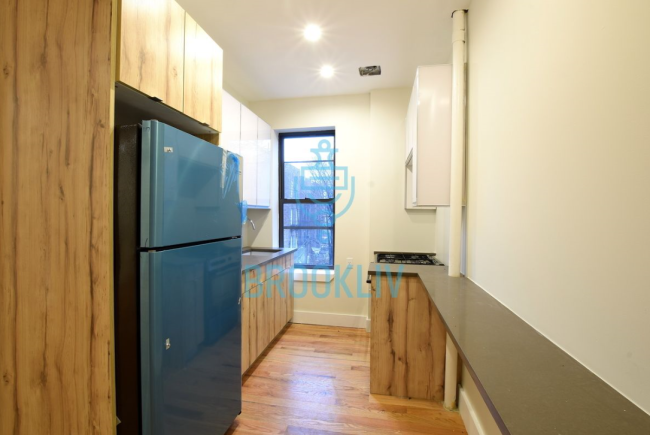Buying and renting NYC apartments with Bitcoin: What the cryptocurrency-curious should know

There are still some barriers to Bitcoin being used in real estate transactions.
iStock
Bitcoin and other cryptocurrencies are seemingly everywhere these days. Once the exclusive province of techno utopians and online black market patrons, Bitcoin is now accepted at a pizzeria and a nail salon in Fort Greene, a bakery on the Lower East Side, and Montessori schools in Manhattan, not to mention at a Lamborghini dealership in Southern California.
When it comes to real estate transactions, though, Bitcoin and other forms of cryptocurrency are still a novelty, and they take a lot of logistical consideration to actually use as a form of payment. Still, a handful of media-savvy and crypto-curious real estate professionals have announced their willingness to accept Bitcoin in recent years, so we thought we'd take a closer look at how exactly that might work. So whether you have a Bitcoin wallet that's bursting at the seams (just kidding, it's not a physical wallet) or you're a small-time landlord with a nerdy tenant who's always going on about how rich you would be if you'd just start accepting rent in crytpo, here's what you need to know.
What is Bitcoin? And what about cryptocurrency?
In the most basic terms, Bitcoin is a digital currency. It's not backed by any government, but it relies on a cryptographic transaction verification system called blockchain that is supposed to make Bitcoin transactions impossible to fake. You'd be forgiven for reading that last sentence a few times and still asking, "Huh?" For a more in-depth primer on the basics of Bitcoin and cryptocurrencies generally, I'd recommend New York magazine's recent "Guide for the Confused."
But I'll continue a bit more here. To generate new bitcoins, people devote huge amounts of computer power to verifying recent Bitcoin transactions, and are rewarded in coins. You don't need an unattended university computer lab to get into the game, though. Cryptocurrency trading platforms such as Coinbase allow you to buy and sell cryptocurrencies using regular money from your bank account, for a small fee.
Cryptocurrency is a catchall term for digital currencies that use blockchain technology. Litecoin and Ethereum are two other prominent ones, but we'll spare you the full list, which includes a rogues gallery of catastrophic failures and Ponzi schemes—these are unregulated, experimental, online systems revolving around money that we're talking about, after all.
The last big wave of publicity around Bitcoin came over the winter, when the value of a single bitcoin shot up from around $7,000 in mid-November to over $19,000 in December. Not bad, especially when you compare that to the year prior, when one bitcoin was worth $900. Sounds exciting, right? It gets less so if you take into account what followed. By the end of 2017, a Bitcoin was trading at around $12,600, and one coin is now worth about half that. So if you put a lot of money into Bitcoin when it was worth $15,000 in hopes of exponential returns, sorry: you just lost almost two thirds of your money.
The volatility is not unique to Bitcoin, and it's thanks largely to a recent surge of interest in crypto trading, in which people trade cryptocurrency like stocks, treating their coins more as investments than a currency. Attention from the better-resourced gamblers of Wall Street is only adding gas to the fire.
This unpredictable quality, coupled with regulatory requirements and the fact that the average New Yorker doesn't know a Bitcoin wallet from a hole in the ground, makes paying rent or buying an apartment with the stuff a tricky proposition. Which brings me to the next question:
Can I buy an apartment using Bitcoin?
Developer Ben Shaoul announced last year that his company Magnum Real Estate is accepting cryptocurrency for deposits and purchases at his projects. So far, two buyers of condos at the Magnum conversion project 389 East 89th St. have paid with Bitcoin, according to Magnum spokespeople. However, this isn't quite as revolutionary as it sounds. That's because the company is using the service BitPay at the time of sale to convert the Bitcoin to cash and complete the transaction using good old fashioned dollars. This last step could easily be done by the buyer just before the purchase if he or she was so inclined.
"It’s a lot like selling your stock to buy a house," says real estate lawyer Toby Cohen of the firm Holm & O'Hara. "You cash it out and use that cash to pay for a house. You’re using the cash generated from the sale, rather than the stock itself."
An actual sale using unconverted Bitcoin would be much more difficult, according to experts we consulted.
"I think using Bitcoin in the real estate closing process on a residential transaction is still a little bit far away from becoming the norm," says real estate attorney Shahriar Sedgh of the firm Sedgh & Zuckerman. "At this point, because Bitcoin is such an attractive idea, a lot of brokers and sellers are using that... to get buyers through the door, but then when it comes to the actual transaction, they're converting it to dollars."
Among the primary hurdles: the buyer and the seller, not to mention the lawyer, the broker, and possibly the accountant and the title insurance person have to have a strong enough understanding of cryptocurrency to be able to structure the transaction to be mostly in Bitcoin. And even if the seller, the broker(s), and the attorney are fine with collecting their payment in Bitcoin, the government won't be, so you'd have to set aside enough dollars to satisfy the city and state real estate transfer taxes.
"You can’t pay transfer taxes in Bitcoin," Cohen says. "The Department of Finance isn't going to take your Bitcoin."
Also, unless you have enough to buy the apartment outright, you'll need a mortgage, which might be tricky to qualify for if a lot of your money is in digital currency. As Cohen says, "You’re going to have trouble getting a bank to accept your Bitcoin ledger as proof of funds. There’s really no way of showing proof of funds for Bitcoin... They don’t know if you’re a black market drug dealer who got paid in Bitcoin. They have all sorts of anti-money laundering obligations."
Volatility is another factor to consider. Sedgh gives the example of a contract on an apartment specifying a Bitcoin purchase price. The closing could not happen for another two or three months, pending board approval. In that time, as we saw recently, the value of the currency could triple or it could drop by two thirds. A possible workaround here could be specifying a dollar equivalent of the amount to be paid in Bitcoin on the closing date.
Finally, knowing that there aren't real-life, publicized examples to draw from, there's the tax man to think about. The IRS treats cryptocurrency as property, not money, and taxes it as such. Assuming you have enough to buy a place outright, enough cash to satisfy the transfer taxes, the seller is willing to accept Bitcoin, and the brokers and lawyers are on board, the seller is going to want to plan to treat any profit from the sale of the place as capital gains, along with profits from trading or holding cryptocurrency, and declare it on taxes for the coming year. Those taxes have to be paid in dollars too.
Can I rent an apartment using Bitcoin?
Sort of. A handful of New York brokerages, including Bond New York, Blooming Sky, and the Brooklyn-focused Brookliv are helping facilitate the use of Bitcoin for deposits and fees. As with Magnum's apartment sales, these firms are converting Bitcoin to dollars at the point of the transaction, rather than them and the landlords they work with accepting and holding the money in crypto form.
"We convert to dollar instantly due to the volatile nature of the currency," Bond New York CEO Noah Freedman tells us. "Hard to explain to [an] agent, 'You really made 30 percent less because, you know, Bitcoin.'"
Similarly, a property management platform called ManageGo allows tenants to pay rent using cryptocurrency, and converts the payments into U.S. dollars for the landlords on the other end.
Ari Weber, CEO of Brookliv, says that his firm got four inquiries about paying in Bitcoin in seven weeks during the Bitcoin boom, but that the calls have slowed down as the currency has depreciated, and it's not exactly a huge part of the company's business.
"Landlords are old-school people," Weber says. "Most landlords know [Bitcoin] in the news, but they’re like, 'Pay in cash, pay online with a credit card.' Most of Brooklyn, they’re pen and paper."
This sounds pretty complicated. Are there advantages to paying in Bitcoin?
The primary appeal of Bitcoin, and what makes it popular among online miscreants and libertarians, is the speed and simplicity with which it can be transferred, assuming the person you're trying to transfer it to knows what it is and how it works. No governments are involved, nor any banks or credit card companies. It's cash, if cash was printed by the collective efforts of a semi-random assortment of humanity instead of the U.S. Mint.
This makes it attractive to foreign buyers and renters, particularly those trying to get money out of countries that might not want that money to leave.
"It’s definitely a lot easier for foreigners," Weber says.
Similarly, Sedgh says he thinks that Treasury Department rules enacted in 2016 requiring disclosure of who's behind anonymous corporations buying multimillion dollar apartments in New York City using all cash "may not apply to Bitcoin transactions." The rules, updated in 2017, require title insurance companies to identify the people controlling limited liability corporations that buy apartments for more than $3 million in Manhattan and for more than $1.5 million in the outer boroughs. The feds intensified scrutiny after a New York Times investigation showed that close to half of luxury real estate purchases in the U.S. are anonymous, and that anonymous buyers in the Time Warner Center include a jet-setting menagerie of accused money launderers, crooked politicians, and fraudsters.
Since the Treasury started looking closely at transactions here and in five other cities, it has found that about three in 10 transactions involve someone who has previously been flagged for suspicious financial transactions. Whether or not buyers and sellers could evade this ramped-up review process with Bitcoin is unclear. The Treasury Department didn't respond to an email seeking comment.
In any event, Sedgh says, Bitcoin is "a way of bringing money out of certain countries where governments may not have relaxed laws for foreign investors. It would be an easy way to bring money out of the country to invest in New York City, which has very pro-investor tax laws."
Then, finally, Triplemint broker Boris Sharapan Fabrikant (Triplemint is a Brick Underground sponsor, FYI) suggested that if you're an apartment buyer on vacation and can't get on the phone with someone at your bank to do a wire transfer, a Bitcoin deposit, to be refunded and replaced with real money when you get back, could be a quick, handy placeholder.
And if all that sounds a bit involved for an already-complicated process, well, it's probably best to stick to regular dollars.
The bottom line: There are a select few brokers and landlords who will let you pay your rent and fees with Bitcoin like you would with a credit card. As for buying an apartment with Bitcoin, it's probably more trouble than it's worth unless you're a) a true believer in the gospel of crypto, or b) trying to move money around "creatively."
You Might Also Like





























